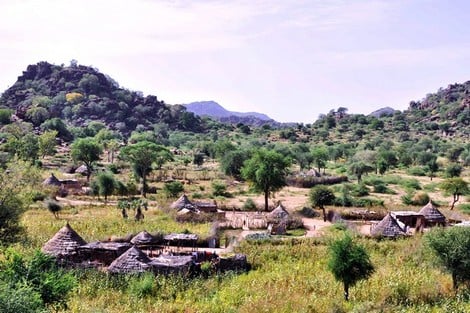Reports
The Nuba Mountains: A Window into Sudan’s Forgotten Crisis

Sudan Events – Agencies
Sudan’s crisis is worsening. Hunger has escalated into famine, Khartoum is destroyed, and targeted ethnic killings in Darfur have reached levels that may surpass the genocide of 20 years ago. Diplomatic efforts have failed to bring the warring parties to the negotiating table or secure more than minimal humanitarian aid.
A Haven for the Fleeing:
Amid this chaos, the Nuba Mountains region, located near the South Sudan border, has become a refuge for hundreds of thousands of fleeing Sudanese. It also provides a small window into what is happening across the rest of the country, with local authorities warning that the region too is facing a famine crisis.
This summer, Refugees International visited the Nuba Mountains and interviewed numerous Sudanese who had recently arrived from different parts of the country. They shared their experiences of the widespread hunger plaguing Sudan. As detailed in a new report, their stories were filled with ongoing atrocities committed by the main warring factions—Sudan’s Armed Forces, the Rapid Support Forces, and their allied militias. The discussions also highlighted a significant reality—in a time of global inaction towards Sudan, the primary factor preventing widespread famine is the effort of local Sudanese civilians and limited cross-border aid. These efforts must be strengthened.
A Shelter Zone:
Since the war broke out in April 2023, the Nuba Mountains have become one of the safest areas. Local authorities and international NGOs estimate that between 700,000 to 1 million people have sought refuge there since April 2023.
The people we spoke with said they fled from food shortages, rape, and random killings. Their words were grim, and their physical conditions, along with the distant look in their eyes, said even more.
Many witnessed atrocities being committed. Hamid, who fled attacks by the Rapid Support Forces near Lagawa, said soldiers were burning homes and killing men, women, and children.
Others mentioned that food shortages were the main cause of their displacement. Abdelbagi, who recently arrived from Kadugli, said that an 8-year-old child traveling with him died of hunger on the way. “Hunger is the number one reason we came here,” he said.
Awadiya, a 42-year-old mother, spent a week searching for food in Kadugli amid harassment and violence from soldiers before fleeing. She arrived after not eating for three days, saying, “The way you see us now is the way we left. No shoes. No food.”
For others, the combination of atrocities and food shortages forced them to flee. Rania, a woman from Khartoum, first fled to Kadugli and then to the Nuba Mountains. She said, “I left Khartoum because of the war, and I left Kadugli because of hunger.”
These experiences represent just a fraction of the broader crisis in Sudan. Around 10 million people have been displaced across the country, with 2 million fleeing to neighboring countries. Half the country faces severe levels of food insecurity, and by the end of July, Sudan’s Famine Review Committee found that famine exists in Darfur. Sudanese humanitarian workers and external experts warn that the actual numbers affected may be much higher.
Peace Committees:
One of the most hopeful aspects of the situation in Sudan is the emergence of local self-help groups, where neighbors come together to set up communal kitchens, provide medical aid, or evacuate people to safer areas.
In the Nuba Mountains, local peace committees have been operating for years, and now they are working with local NGOs to help new arrivals and ease tensions over increasingly scarce resources.
Recently, emergency rooms have been set up across Sudan, saving many lives with moderate external support, and they are ready to expand efforts in areas that international groups cannot reach. As one local representative told us: “There is a great need to empower local organizations to provide more services… but resources are low.”
Providing Aid:
To stop the death toll in Sudan, the UN, donor countries, and nations with influence over the warring parties must pressure the combatants to allow humanitarian access. The recent announcement of reopening a key border access point for aid into Darfur is encouraging, but it remains fragile and should be just the beginning of increased efforts. International actors must deliver aid across borders (even if the warring parties attempt to block it), increase support for local groups, and back efforts in relatively stable areas, like the Nuba Mountains, where more people are sure to seek refuge.
It may already be too late to prevent famine, but acting now can help stop its spread and save hundreds of thousands, if not millions, of lives.



